 She Who Knows by Nnedi Okorafor
She Who Knows by Nnedi Okorafor Format: eARC
Source: supplied by publisher via NetGalley
Formats available: hardcover, paperback, ebook, audiobook
Genres: African Futurism, science fantasy, science fiction
Series: She Who Knows #1
Pages: 176
Published by DAW on August 20, 2024
Purchasing Info: Author's Website, Publisher's Website, Amazon, Barnes & Noble, Kobo, Bookshop.org, Better World Books
Goodreads
Part science fiction, part fantasy, and entirely infused with West African culture and spirituality, this novella offers an intimate glimpse into the life of a teenager whose coming of age will herald a new age for her world. Set in the universe Africanfuturist luminary Nnedi Okorafor first introduced in the World Fantasy Award-winning Who Fears Death, Firespitter is the first in the She Who Knows trilogy
When there is a call, there is often a response.
Najeeba knows.
She has had The Call. But how can a 13-year-old girl have the Call? Only men and boys experience the annual call to the Salt Roads. What’s just happened to Najeeba has never happened in the history of her village. But it’s not a terrible thing, just strange. So when she leaves with her father and brothers to mine salt at the Dead Lake, there’s neither fanfare nor protest. For Najeeba, it’s a dream come travel by camel, open skies, and a chance to see a spectacular place she’s only heard about. However, there must have been something to the rule, because Najeeba’s presence on the road changes everything and her family will never be the same.
Small, intimate, up close, and deceptively quiet, this is the beginning of the Kponyungo Sorceress.
My Review:
The story begins, as so many of this author’s stories do, with a young African woman on the cusp of change in a world that has already changed and been changed from the one we know now.
In the case of this particular story and this particular young woman and this particular version of the future, Najeeba is thirteen when the story begins, and is about to go on a journey. A journey that members of her family take every year – but a journey that females are not supposed to undertake at all.
Not that there are laws against it, but there are rules – rules enforced by a social contract that have ossified into restrictions that no one challenges. Not until Najeeba comes in and tells her parents that she feels the call of the ancestral salt road every bit as much – if not a bit more and a bit sooner – than her father and her brothers.
In the desert, salt is life. Finding the best salt, the purest AND prettiest blocks of it, and selling them for the best price in distant markets, keeps her family and her village alive and prosperous. Most of the time.
Because her people have historically been considered unclean, untouchable outcasts. A judgment that Najeeba’s inclusion in the annual salt harvest is guaranteed to make worse AND more violent – even as it confers upon Najeeba the kind of power that is guaranteed to bring down retribution – both human and divine.
And gives birth, literally and figuratively, to a woman who will change the world.
 Escape Rating B+: She Who Knows is the first book in a prequel trilogy of novellas to the author’s award-winning novel Who Fears Death. In a way that story literally gives birth to this one as this one gives birth to that, as Najeeba, “she who knows”, is the mother of Onyesonwu, “who fears death”.
Escape Rating B+: She Who Knows is the first book in a prequel trilogy of novellas to the author’s award-winning novel Who Fears Death. In a way that story literally gives birth to this one as this one gives birth to that, as Najeeba, “she who knows”, is the mother of Onyesonwu, “who fears death”.
I haven’t read Who Fears Death, although I have a copy in both text and audio and plan to listen to it. While it has certainly climbed up the virtually towering TBR pile after finishing She Who Knows, I don’t feel like I missed anything by reading this book first. After all, it IS a prequel and not a sequel. It sets the stage for Who Fears Death without giving anything away or providing spoilers.
What it does remind me of, a lot, is the author’s Desert Magician’s Duology, particularly Shadow Speaker. Not only do Najeeba’s and Eiji’s stories start from a similar place, as both begin their stories as girls on the cusp of womanhood, gifted or cursed (depending on one’s perspective) with magical powers, but both choose difficult paths that their birth cultures reserve for men and they also find themselves telling – and being told – their stories by and to strange desert sorcerers.
They are not products of the same Afrocentric future world, but their worlds are similar nonetheless. Meaning that if you like one, or if you have enjoyed ANY of the author’s previous and/or successive works such as the Binti Trilogy, there’s a very good chance you’ll fall right into She Who Knows as well.
In the end – and also as a beginning – this is a great introduction to Who Fears Death AND The Book of Phoenix, which is a much earlier prequel chronologically to Onye’s story. Not only is this a great story in its own right, but it’s also short which means that it provides an introduction in an easily consumed little package. And if that consumption leaves you with a taste for more – as it very much did this reader – this is, oh-so-thankfully, the first novella in the projected trilogy of equally short and undoubtedly equally salty and delicious stories.
I am definitely looking forward to the rest of Najeeba’s story, which will be continued in next year’s One Way Witch. In the meantime I can’t wait to see how the mother’s experiences in this book and the rest of the trilogy are reflected in the child in Who Fears Death.

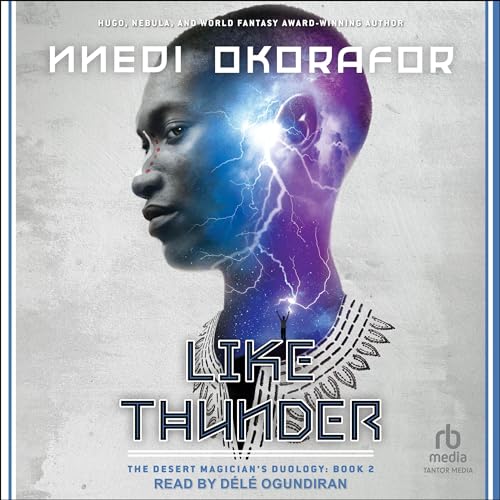 Like Thunder (The Desert Magician's Duology #2) by
Like Thunder (The Desert Magician's Duology #2) by 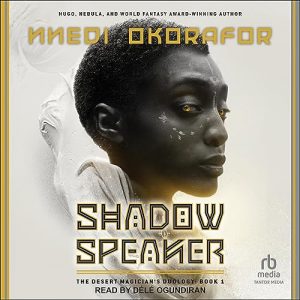 Escape Rating A-: As much as I loved
Escape Rating A-: As much as I loved 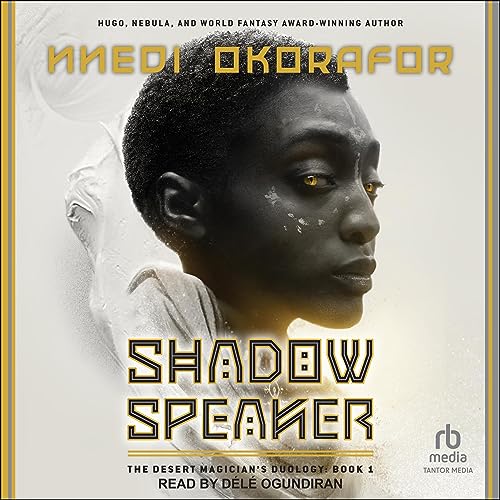 Shadow Speaker (The Desert Magician's Duology, #1) by
Shadow Speaker (The Desert Magician's Duology, #1) by 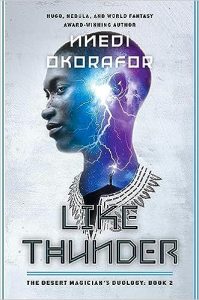 Which means that while the narrator, Délé Ogundiran, does an excellent job of standing in as Ejii’s voice, that may not be true for the second book in the duology, which will be Dikéogu’s story. Hopefully by the point in Dikéogu’s life when that story takes place, his voice will have dropped.
Which means that while the narrator, Délé Ogundiran, does an excellent job of standing in as Ejii’s voice, that may not be true for the second book in the duology, which will be Dikéogu’s story. Hopefully by the point in Dikéogu’s life when that story takes place, his voice will have dropped.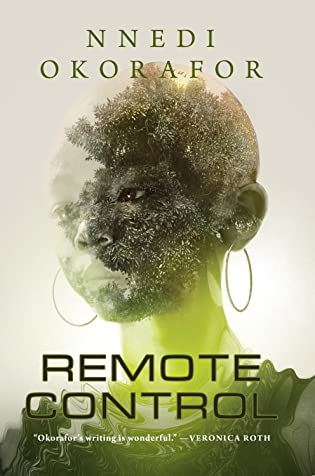 Remote Control by
Remote Control by 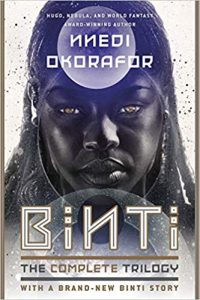 Escape Rating A: Remote Control is a novella, meaning that it is relatively short but complete in and of itself. So if you love SF and have not yet read any of Nnedi’s books, this is a great place to start. As is her absolutely awesome
Escape Rating A: Remote Control is a novella, meaning that it is relatively short but complete in and of itself. So if you love SF and have not yet read any of Nnedi’s books, this is a great place to start. As is her absolutely awesome